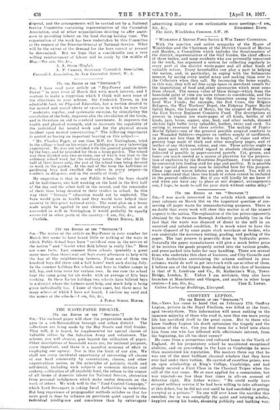[To THE EDITOR OF THE "SPECTATOR.") SIR,---I have read your
article on "Boy-Power and Soldier- Power "-in your issue of March 31st with much interest, and I venture to make a suggestion which 1 think will meet some of the objections to your scheme. Sir Frederick Treves, in his admirable book on Physical Education, has a section devoted to the mental and moral effects of exercise in which he says that " moderate, regular, and systematic exercise, by stimulating the circulation of the body, improves also the circulation of the brain, and is therefore an aid to cerebral movements. It improves the health and physical strength, and so increases the capability Of the individual for mental work and for the physical strain incident upon mental concentration." The following experiment is quoted as having an important bearing on this subject:-
" Mr. Charles Paget, at one time M.P. for Nottingham, tried in the village school on his estate at Ruddington a very interesting experiment, lie was not satisfied with the general progress made by the boys, and he provided for them a large garden. The school was then divided into two sections, one of which was kept to the ordinary school work for the ordinary hours, the other for the half of these hours only, the rest of the school time being devoted to work in the garden. At the end of the term the half-time or gardening boys had excelled the others in every respect—in conduct, iu diligence, and in the results of study."
My suggestion is that in our Public Schools the boys should all be half-timers, ono half working on the land in the first half of the day and the other half in the second, and the remainder of their time being devoted to their studies in school. In this way their " literary " education would not be neglected. The boys would gain in health and they would have helped their country in this great national crisis. The same plan on a lesser scale might be applied to our elementary schools, and as it succeeded so well in Nottingham it would probably be equally successful in other parts of the country.—I am, Sir, &c.,


























 Previous page
Previous page